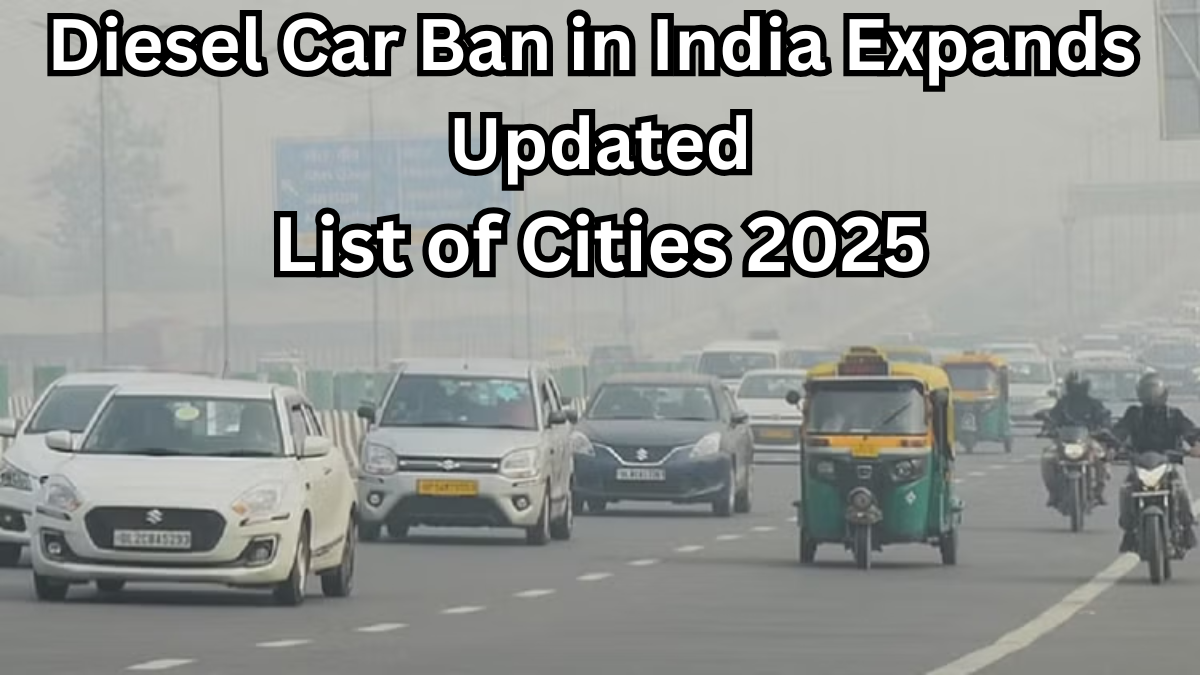India is taking major steps to tackle urban air pollution, and in 2025, the diesel car ban is expanding to more cities than ever. If you own a diesel vehicle or are planning to buy one, here’s a complete breakdown of the new Diesel Car Ban Cities List 2025, what it means for you, and how environmental regulations are reshaping urban mobility.

Why the Diesel Car Ban is Expanding
Rising pollution levels in Indian cities have forced the government and regulatory bodies like the National Green Tribunal (NGT) to implement stricter environmental regulations. Diesel engines are known to emit high levels of nitrogen oxides and particulate matter, both hazardous to public health and the environment.
Key Reasons Behind the Ban:
-
High contribution of diesel cars to PM 2.5 and NOx pollution
-
Pressure from global climate agreements to reduce carbon footprint
-
Encouragement for citizens to shift to EVs and CNG alternatives
Diesel Car Ban Cities List 2025 – Updated and Expanded
Here’s a look at the latest cities included in the Diesel Car Ban Cities List 2025 along with the ban details:
| City | Ban Details | Effective From |
|---|---|---|
| Delhi NCR | Ban on 10+ year old diesel vehicles | Already Active |
| Mumbai | Ban on diesel vehicles over 10 years | March 2025 |
| Bengaluru | Diesel autos & cabs phased out in city limits | April 2025 |
| Hyderabad | 15-year diesel vehicle ban in select zones | July 2025 |
| Kolkata | Phased ban on commercial diesel vehicles | August 2025 |
| Chennai | 10-year cap on diesel cars, EV push | September 2025 |
| Ahmedabad | Restrictions in emission hotspot areas | October 2025 |
| Pune | Diesel cabs & buses replaced with EVs | December 2025 |
The Diesel Car Ban Cities List 2025 is likely to expand further, with several Tier-2 cities currently under evaluation.
How Will the Ban Impact You?
If you’re a diesel car owner, here’s what you should keep in mind:
-
Resale Value Will Drop: Expect depreciation, especially in banned cities
-
Limited Re-registration: Vehicles over 10–15 years may not be re-registered in major metros
-
Switch to Alternatives: EVs, hybrids, or petrol cars are safer investments
-
Use Outside Urban Limits: Older diesel vehicles might still be usable in rural or non-restricted areas
Environmental Regulations: A Shift Towards Cleaner Mobility
India’s environmental regulations are not only about banning old vehicles. They form part of a broader effort to promote green and sustainable mobility across the country.
Government Measures to Support the Shift:
-
Subsidies on electric vehicles through FAME-II
-
Installation of EV charging stations across major cities
-
Higher road tax and registration costs for diesel vehicles
-
Transition of public transport fleets to electric and CNG
What You Can Do as a Car Owner
To stay prepared:
-
Stay Updated on your city’s diesel policy
-
Consider Selling or Scrapping older diesel cars under government incentives
-
Choose Future-Ready Vehicles like EVs or hybrids
-
Avoid Buying Diesel Vehicles if you live in or near a city on the ban list
FAQs
Q1. Can I drive my 10-year-old diesel car in cities like Mumbai or Bengaluru?
No, these cities will implement bans on 10-year-old diesel cars starting mid to late 2025. Driving such vehicles in restricted zones will not be allowed.
Q2. Is the diesel car ban applicable to private vehicles or only commercial ones?
Both categories are affected. While commercial vehicles face quicker implementation, private diesel cars over 10–15 years old are also being phased out.
Q3. What are my options if my car is banned in my city?
You can scrap it under a certified policy, sell it in a non-restricted area, or switch to an eco-friendly model such as an EV or petrol car.
Q4. Will newer BS6 diesel vehicles be banned too?
Currently, only older diesel vehicles are being targeted. BS6-compliant vehicles are safe for now, but long-term environmental regulations may tighten further.
Click here to learn more
Pari is a passionate writer known for captivating stories that blend imagination and reality. Inspired by travel, history, and everyday moments, Pari crafts narratives that resonate deeply with readers.